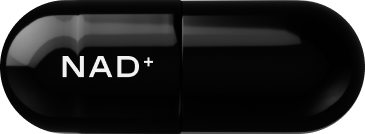

Collagen is the most abundant protein in the human body, making up connective tissues like skin, bones, joints, tendons, and blood vessels. But as natural collagen production declines with age, people often turn to collagen supplements to support skin elasticity, joint health, and even gut health.
Two of the most popular collagen sources are marine collagen and bovine collagen. Both offer unique health benefits, but which is best for you? At Tally Health, we’ve formulated Vitality by Tally Health, which features clinically studied ingredients to complement collagen supplementation for healthier aging.
Let’s break down the differences between marine collagen vs bovine collagen so you can make the most informed choice for your skincare routine, joint comfort, and overall well-being.
What Is Bovine Collagen?

Bovine collagen comes from cow hides and other connective tissues. When processed through a process called hydrolysis, it becomes bovine collagen peptides or hydrolyzed collagen, which are smaller, easily absorbed collagen molecules.
Key Features of Bovine Collagen:
Rich in type I and type III collagen (important for skin elasticity, hair thickness, nail health, and other connective tissues).
Supports joint cartilage and bone health.
Often sourced from grass fed collagen, which may offer higher quality and cleaner collagen products.
Bovine collagen is especially valued for supporting skin elasticity, muscle recovery, and joint function.
What Is Marine Collagen?

Marine collagen is derived from fish skin and scales. This source is known for its high bioavailability, meaning the collagen proteins are absorbed more efficiently by the body.
Key Features of Marine Collagen:
Primarily made up of type I collagen, the main collagen found in skin, bones, and tendons.
Often recommended to improve skin elasticity, reduce wrinkles, and promote radiant skin.
Provides a strong amino acid profile, with plenty of essential amino acids and bioactive peptides.
A great option for those avoiding cow hides due to dietary restrictions.
Because of its smaller collagen molecules, marine collagen supplements are considered one of the most effective for promoting glowing skin and healthy skin.
Marine Collagen vs Bovine Collagen: How They Compare

When comparing marine collagen vs bovine collagen, here’s what you need to know:
Ultimately, marine collagen vs bovine collagen comes down to your priorities:
Choose marine collagen if your focus is glowing skin, reduce wrinkles, and \skin elasticity support.
Choose bovine collagen if your goal is to support joint health, bone regeneration, and muscle recovery.
How to Choose the Right Collagen Supplement

Both marine collagen supplements and bovine collagen peptides can help maintain collagen levels as you age. To maximize results:
Pair your collagen with vitamin C (found in Tally Health’s Defend supplement), which is essential for collagen production.
Look for pure collagen in powder form or capsules to fit seamlessly into your daily routine.
Consider your skin concerns, joint function needs, and dietary restrictions before choosing.
Always check product sourcing—grass fed bovine collagen or sustainably sourced fish collagen are higher-quality options.
If you have seafood allergies or fish allergies, stick with bovine collagen instead of marine collagen.
Bottom Line: Marine Collagen vs Bovine Collagen

Both marine collagen and bovine collagen offer powerful health benefits through collagen supplementation. If you want to support skin elasticity and achieve a more radiant skin appearance, marine collagen may be your best bet. If you’re aiming to support joint health, bone health, and muscle recovery, bovine collagen is an excellent choice.
Whichever you choose, consistency is key. And for an advanced approach to aging well, pair your collagen routine with ingredients that go beyond skin and joints. Vitality by Tally Health is designed to complement collagen products and provide additional support for long-term skin health, joint function, and overall vitality.
References
Diogo et al. In vivo assessment of marine vs bovine origin collagen-based composite scaffolds promoting bone regeneration in a New Zealand rabbit model. Biomater Adv 2024; https://doi.org/10.1016/j.bioadv.2024.213813
Wang. A Review of the Effects of Collagen Treatment in Clinical Studies. Polymers (Basel) 2021; https://doi.org/10.3390/polym13223868
Rahman et al. Unlocking the Therapeutic Potential of Marine Collagen: A Scientific Exploration for Delaying Skin Aging. Mar Drugs 2024; https://doi.org/10.3390/md22040159
Khatri et al. The effects of collagen peptide supplementation on body composition, collagen synthesis, and recovery from joint injury and exercise: a systematic review. Amino Acids 2021; https://doi.org/10.1007/s00726-021-03072-x
Pu et al. Effects of Oral Collagen for Skin Anti-Aging: A Systematic Review and Meta-Analysis. Nutrients 2023; https://doi.org/10.3390/nu15092080
Miranda et al. Effects of hydrolyzed collagen supplementation on skin aging: a systematic review and meta-analysis. Int J Dermatol 2021; https://doi.org/10.1111/ijd.15518
What is marine collagen?
Marine collagen is derived from fish skin and scales. This source is known for its high bioavailability, meaning the collagen proteins are absorbed more efficiently by the body.
What is bovine collagen?
Bovine collagen comes from cow hides and other connective tissues. When processed through a process called hydrolysis, it becomes bovine collagen peptides or hydrolyzed collagen, which are smaller, easily absorbed collagen molecules.
Marine collagen or bovine collagen?
Ultimately, marine collagen vs bovine collagen comes down to your priorities:
Choose marine collagen if your focus is glowing skin, reduce wrinkles, and \skin elasticity support.
Choose bovine collagen if your goal is to support joint health, bone regeneration, and muscle recovery.










